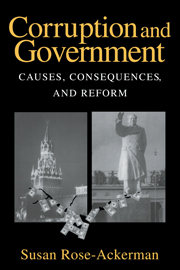Book contents
- Frontmatter
- Contents
- Preface
- 1 Introduction: The Costs of Corruption
- Part I Corruption as an Economic Problem
- Part II Corruption as a Cultural Problem
- Part III Corruption as a Political Problem
- 7 Corruption and Politics
- 8 Democracy and Corruption: Incentives and Reforms
- 9 Controlling Political Power
- Part IV Achieving Reform
- References
- Name Index
- Subject Index
7 - Corruption and Politics
Published online by Cambridge University Press: 05 June 2012
- Frontmatter
- Contents
- Preface
- 1 Introduction: The Costs of Corruption
- Part I Corruption as an Economic Problem
- Part II Corruption as a Cultural Problem
- Part III Corruption as a Political Problem
- 7 Corruption and Politics
- 8 Democracy and Corruption: Incentives and Reforms
- 9 Controlling Political Power
- Part IV Achieving Reform
- References
- Name Index
- Subject Index
Summary
Corruption describes a relationship between the state and the private sector. Sometimes state officials are the dominant actors; in other cases private actors are the most powerful forces. The relative bargaining power of these groups determines both the overall impact of corruption on society and the distribution of the gains between bribers and bribees.
Analysis of corruption is part of the ongoing and inconclusive debate about which form of government is most conducive to economic growth. Although wealthy countries do tend to be democracies, there is no simple statistical relationship between growth and democratic government (Huber, Rueschemeyer, and Stephens 1993; Przeworski and Limongi 1993). The reason for this is not difficult to fathom: “Democracy” is simply too general a term to capture the range of government forms that come under that rubric. Furthermore, a government structure that works well in one country may be dysfunctional in another context. Widespread, entrenched corruption is one form of dysfunction.
Is the establishment of democracy an anticorruption strategy? The desire for reelection constrains the greed of politicians. The protection of civil liberties and free speech, which generally accompanies democratic electoral processes, makes open and transparent government possible. In contrast, non-democratic states are especially susceptible to corrupt incentives because their rulers have the potential to organize government with few checks and balances. But this contrast is too sharp. One need look no further than Newark and Chicago in the United States to find well-established corrupt systems that compare quite well with autocratic systems.
- Type
- Chapter
- Information
- Corruption and GovernmentCauses, Consequences, and Reform, pp. 113 - 126Publisher: Cambridge University PressPrint publication year: 1999
- 1
- Cited by



